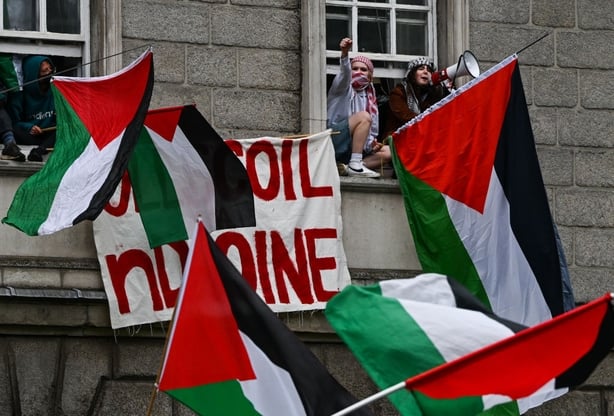The five-day protest camp at Trinity College Dublin (TCD) over the war in Gaza has ended, after the university tonight agreed to the demands of the protesting students.
In a statement to RTÉ News this evening, a TCD spokesperson confirmed that "an agreement was reached at a meeting this afternoon" and after "successful talks between the university's senior management and the protestors".
The position was confirmed by TCD Students Union president Lazslo Molnarfi, who said that after two meetings earlier today, the students had received a letter from the university - which has been seen by RTÉ News - confirming their demands had been met.
Mr Molnarfi said that once the university confirmed this in a formal, public statement, the US-style student protest camp would be brought to an end this evening.
The protest camp started on Friday evening due to the war in Gaza, and had called for an end to all divestments by the university in Israeli institutions.
TCD's public statement, has this evening confirmed that the university "will complete a divestment from investments in Israeli companies that have activities in the Occupied Palestinian Territory and appear on the UN blacklist in this regard".

TCD said this process "is expected to be completed by June", but said one Israeli company which is on its supplier list will remain in place until March 2025 for contractual reasons.
The university also said it "will endeavour to divest from investments in other Israeli companies" and that this will be considered by a taskforce in the coming months.
The university said once the protest camp and "blockade" of the Book of Kells have ended, "plans are being put in place to return to normal university business for staff, students and members of the public".
Senior Dean Professor Eoin O'Sullivan, who led the talks for Trinity, said: "We are glad that this agreement has been reached and are committed to further constructive engagement on the issues raised. We thank the students for their engagement."
Draft bill obliging universities to divest Israeli ties
Meanwhile, Sinn Féin has drafted a bill which would oblige Irish universities to cease any investments which support "certain Israeli settlement activity in the occupied Palestinian territory".
Mairéad Farrell, the party's Spokesperson on Further and Higher Education, said that the Irish Universities (Amendment) Bill (2024) comes as the Irish people "are clear on their stance" over the Israeli military campaign in Gaza.
Ms Farrell praised the "courageous" acts of the students in TCD, who have "unified with staff" to deliver a "really powerful" message on the massive loss of civilian lives in the enclave.
The bill is "saying very clearly, do not invest" in those who are occupying Palestinian territory. Universities can "have no hand, act or part" in such activities, Ms Farrell told RTÉ News.
The Bills Office in the Oireachtas has received the draft legislation, and the deputy expressed her hope that it would be "made a priority", allowing her to introduce it in the Dáil before the summer recess in mid-July.
The bill would also ban investing in any country or region named on the European Union's list of non-cooperative jurisdictions for tax purposes.
Nor would universities be allowed to invest in those named on the Financial Action Taskforce’s (FACT) list of non-cooperative countries and territories for the prevention of money laundering and terrorist financing.
Earlier in the Dáil, Taoiseach Simon Harris said that universities should "reflect" on links to Israel and the issue of divestment.
He would not comment specifically on the protest at TCD, but addressed the issue "more broadly".
Mr Harris was responding to Solidarity-PBP TD Bríd Smith who praised the students' courage, bravery and determination, which she said was causing change around the world.






